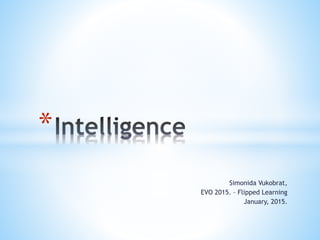Intelligence / EVO
•Descargar como PPT, PDF•
3 recomendaciones•2,138 vistas
Different questions about the intelligence
Denunciar
Compartir
Denunciar
Compartir

Recomendados
Recomendados
Más contenido relacionado
Destacado
Destacado (20)
Similar a Intelligence / EVO
Similar a Intelligence / EVO (7)
Introduction to philosophy of a human person - lesson 1

Introduction to philosophy of a human person - lesson 1
Más de Simonida Vukobrat
Más de Simonida Vukobrat (11)
Último
APM Welcome
Tuesday 30 April 2024
APM North West Network Conference, Synergies Across Sectors
Presented by:
Professor Adam Boddison OBE, Chief Executive Officer, APM
Conference overview:
https://www.apm.org.uk/community/apm-north-west-branch-conference/
Content description:
APM welcome from CEO
The main conference objective was to promote the Project Management profession with interaction between project practitioners, APM Corporate members, current project management students, academia and all who have an interest in projects.APM Welcome, APM North West Network Conference, Synergies Across Sectors

APM Welcome, APM North West Network Conference, Synergies Across SectorsAssociation for Project Management
This presentation was provided by William Mattingly of the Smithsonian Institution, during the fourth segment of the NISO training series "AI & Prompt Design." Session Four: Structured Data and Assistants, was held on April 25, 2024.Mattingly "AI & Prompt Design: Structured Data, Assistants, & RAG"

Mattingly "AI & Prompt Design: Structured Data, Assistants, & RAG"National Information Standards Organization (NISO)
God is a creative God Gen 1:1. All that He created was “good”, could also be translated “beautiful”. God created man in His own image Gen 1:27. Maths helps us discover the beauty that God has created in His world and, in turn, create beautiful designs to serve and enrich the lives of others.
Explore beautiful and ugly buildings. Mathematics helps us create beautiful d...

Explore beautiful and ugly buildings. Mathematics helps us create beautiful d...christianmathematics
Último (20)
IGNOU MSCCFT and PGDCFT Exam Question Pattern: MCFT003 Counselling and Family...

IGNOU MSCCFT and PGDCFT Exam Question Pattern: MCFT003 Counselling and Family...
Web & Social Media Analytics Previous Year Question Paper.pdf

Web & Social Media Analytics Previous Year Question Paper.pdf
APM Welcome, APM North West Network Conference, Synergies Across Sectors

APM Welcome, APM North West Network Conference, Synergies Across Sectors
Interactive Powerpoint_How to Master effective communication

Interactive Powerpoint_How to Master effective communication
Ecosystem Interactions Class Discussion Presentation in Blue Green Lined Styl...

Ecosystem Interactions Class Discussion Presentation in Blue Green Lined Styl...
A Critique of the Proposed National Education Policy Reform

A Critique of the Proposed National Education Policy Reform
BAG TECHNIQUE Bag technique-a tool making use of public health bag through wh...

BAG TECHNIQUE Bag technique-a tool making use of public health bag through wh...
Mattingly "AI & Prompt Design: Structured Data, Assistants, & RAG"

Mattingly "AI & Prompt Design: Structured Data, Assistants, & RAG"
Explore beautiful and ugly buildings. Mathematics helps us create beautiful d...

Explore beautiful and ugly buildings. Mathematics helps us create beautiful d...
social pharmacy d-pharm 1st year by Pragati K. Mahajan

social pharmacy d-pharm 1st year by Pragati K. Mahajan
Intelligence / EVO
- 1. Simonida Vukobrat, EVO 2015. – Flipped Learning January, 2015.
- 2. *We are talking about intelligence. *Most people would like to be clever, but is it always possible? Many factors affect the final result. *The next few lessons we will deal with various aspects of intelligence and you’ll have some tasks to do!
- 3. *First af all, let’s watch two short films. *The first one is about the great English novelist, Helen Keller, born in XIX century. In her early childhood (18 months old), after serious illness, she stayed blind, deaf and mute. She was pretty wild in her childhood... *The second one is about two feral (wild) children, abandoned and raised by the animals, as Tarzan was! They were found 40- 50 years ago! One of them, named Oxana, was raised by the dog, and when found, behaved like a dog! The other, Genie, was kept isolated in an empty room for 13 years since she was born, with no people to talk to, no toys to play with... Her only environment was one bed and one chair! She was never learned anything, not even to speak or walk! When found, she behaved like mentally ill person, almost mute... *All three were born as normal kids (Oxana 35 years ago, and Genie maybe 50 years ago) *After watching films, you’ll have some questions to think about! The films
- 4. About Helen Keller (click the picture or the link bellow; you’ll need internet connection for watching films) http://zapt.io/tezafnag
- 5. About Oxana and Genie (click the picture or the link bellow; you’ll need internet connection for watching films) https://www.youtube.com/watch?v=CV6LEf7EDAQ
- 6. * Here are some questions to think about: - What factors are important for the development of intelligence? - Which one of them are the most important (if you can choose)? Please, try to find arguments for your attitude: 1. Genes 2. Environment 3. Personal activity - Is there any chance for disabled person to include in a normal society and life? - When is it very hard to expect disabled person to develop normal life skills? - What do you think about inclusion of disabled people in education and normal life? Do you recognize them in your environment? - Do we have only one intelligence or there are different types of intelligence? That is the question of it’s structure! - What’s the average IQ? - What’s the minimum and whath’s the maximum of IQ? - what is the percentage distribution of average, above average and below- average intelligent people? Which category of these three is most common in the population? This questions are for the next lesson!
- 7. Fill in the glossaries at the end of your niotebooks new terms you have learned!
